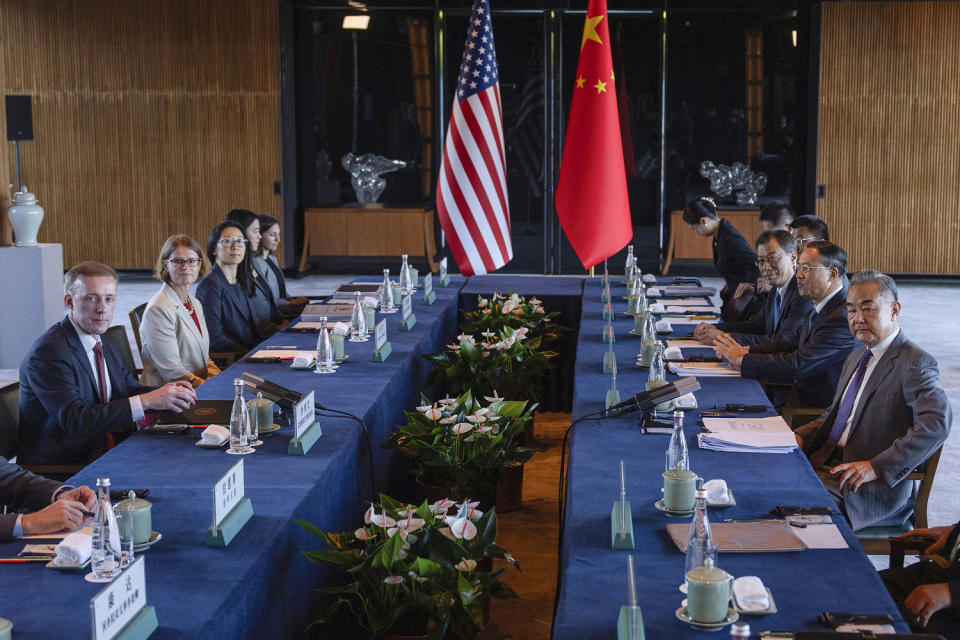HONG KONG — National security adviser Jake Sullivan met with a top Chinese defense official in Beijing on Thursday, a day after the White House said President Joe Biden and Chinese leader Xi Jinping would speak by phone “in the coming weeks.”
Sullivan, who is on his first trip to China as national security adviser, met with Gen. Zhang Youxia, vice chairman of China’s Central Military Commission, in the highest-level public engagement the Biden administration has had with the Chinese military.
Sullivan “stressed that both countries have a responsibility to prevent competition from veering into conflict or confrontation,” the White House said in a readout of their meeting.
The meeting comes at a time of rising military tensions between China and U.S. allies in the Asia-Pacific, where Washington has criticized growing Chinese pressure on Taiwan, a self-governing island democracy claimed by Beijing, and Chinese military actions in the South China Sea, a strategically important waterway that Beijing claims virtually in its entirety.
The White House said Sullivan raised the importance of peace and stability in the Taiwan Strait and the U.S. commitment to freedom of navigation in the South China Sea, as well as concerns about Chinese support for Russia’s defense industrial base as it wages war against Ukraine.
Zhang said that maintaining stability in U.S.-China military and security matters was “in both parties’ interest and is also what the international community expects.” But he emphasized that the status of Taiwan was “at the core of China’s core interests,” and said the U.S. should “stop its military collusion with Taiwan, stop arming Taiwan and stop spreading false narratives about Taiwan.”
“‘Taiwan independence’ and peace in the Taiwan Strait are like fire and water — they cannot coexist,” Zhang said, according to a readout from the Chinese Defense Ministry.
Their meeting was the first time a U.S. official had met with a commission vice chair since Defense Secretary Jim Mattis in 2018.
Chinese state media reported that Sullivan would meet with Xi later Thursday.
Sullivan arrived in Beijing on Tuesday for two days of talks with Chinese Foreign Minister Wang Yi as part of an effort to address tensions in what is generally considered the most important bilateral relationship in the world.


The White House said the two sides had held “candid, substantive and constructive” talks on a range of bilateral, regional and global issues.
“Both sides welcomed ongoing efforts to maintain open lines of communication, including planning for a leader-level call in the coming weeks,” it said in a readout of the Sullivan-Wang meeting.
A readout from the Chinese foreign ministry said the two sides “discussed a new round of interaction between the two heads of state in the near future.”
Both sides said there are also plans for a call between their respective military theater commanders. Xi agreed to resume military-to-military communications last year after he cut them off in 2022 in response to a visit to Taiwan by Rep. Nancy Pelosi,D-Calif., the U.S. House speaker at the time.
The Biden administration has sought to “responsibly manage” competition with China while also seeking areas for cooperation, such as climate change and the international flow of illicit drugs. But relations reached their lowest point in decades early last year after a Chinese spy balloon appeared over North America and was shot down by the U.S. military.
In an attempt to stabilize ties, Sullivan and Wang have held a series of backchannel meetings since last year. They met in Vienna in May 2023, Malta in September and Bangkok in January. Wang also visited Washington in October to meet with Biden.
But this was Sullivan’s first trip to China as national security adviser and the first by a national security adviser since Susan Rice near the end of the Obama administration in 2016. Rice was also the last national security adviser to meet with a vice chairman of the Central Military Commission.
“We are working to ensure that competition does not veer into conflict and that we find ways to work together where our interests align,” Sullivan said after arriving in Beijing on Tuesday.
Biden and Xi have spoken only once by phone since November, when they held four hours of talks in California on the sidelines of the Asia-Pacific Economic Cooperation (APEC) Leaders’ Meeting. With direct contact so rare, the two leaders have few opportunities left to interact one-on-one before Biden leaves the White House early next year.
They reached agreements in several areas during their talks in November, including counternarcotics, military-to-military communications and artificial intelligence safety and risk. The White House said Sullivan and Wang discussed next steps for implementing those agreements.
China said Wednesday that a second round of U.S.-China talks on AI was being planned.
They also discussed cooperation in other areas, such as the repatriation of undocumented migrants and climate change. China and the U.S. are the world’s two biggest greenhouse gas emitters.
Without specifying a date, the White House readout mentioned a coming trip to China by John Podesta, who recently succeeded John Kerry as the U.S. climate envoy.
This article was originally published on NBCNews.com
